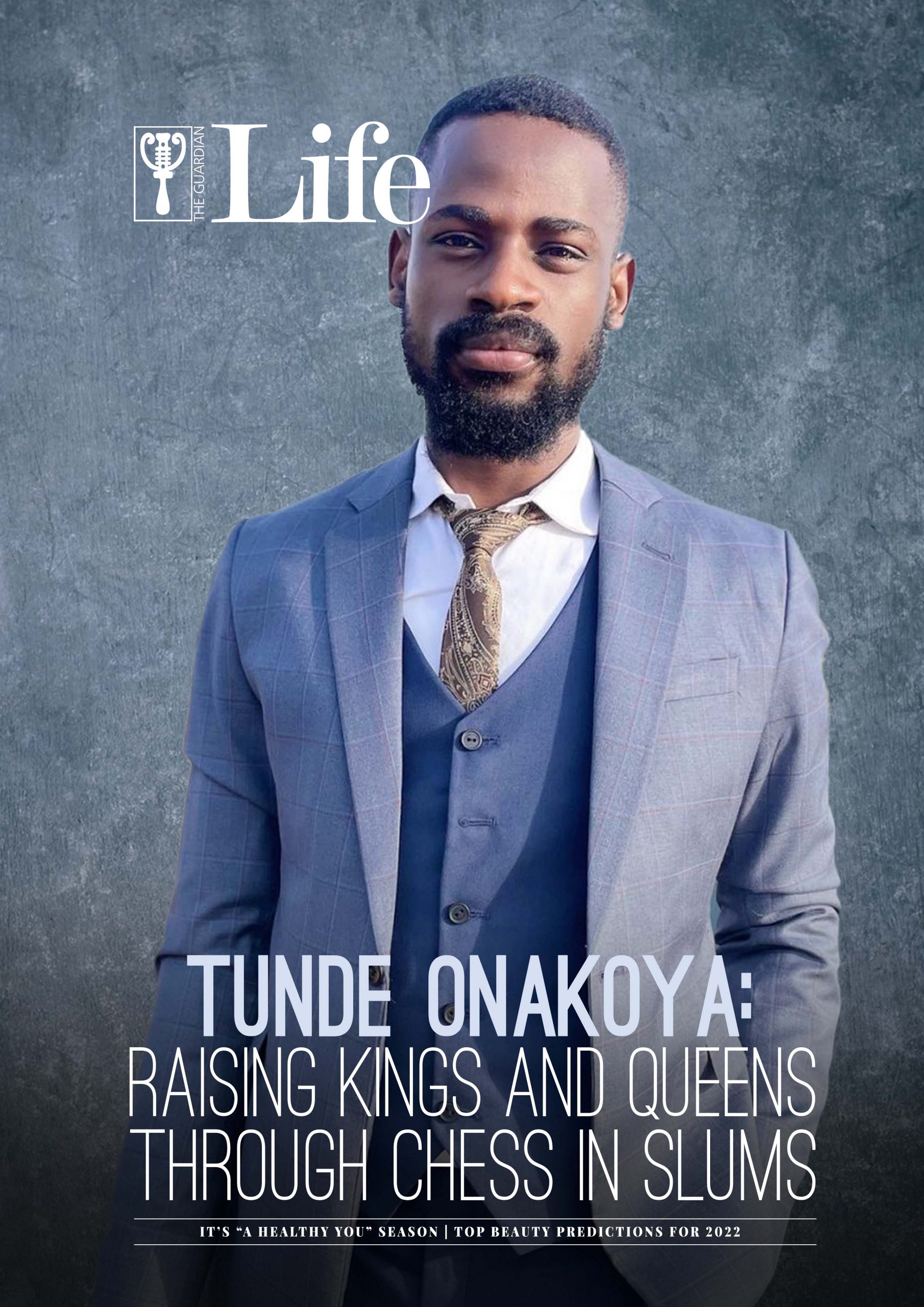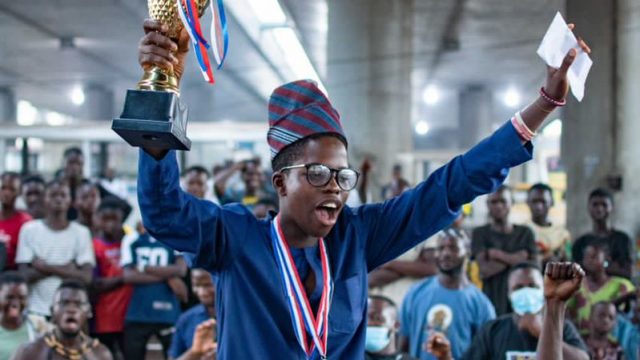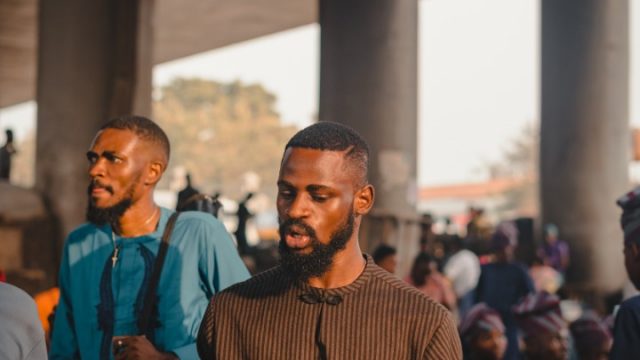
“Poorly explain what you do for a living.”
“I teach people how to drop weapons and pick up plastic pieces”– Tunde Onakoya responds to a Twitter user who has posted the first statement on her timeline.
Only that this time, the plastic pieces he refers to, are chess pieces.
In a board of chess, the king’s life is at stake. With the rook, bishop, knight, and pawn set for battle, they are met with an equal amount of opposition strength. They must then counter with skills, knowledge, patience, tactics, and above all, strategy.
Life in Nigeria can sometimes take the semblance of a game of chess. With about 40% of the country’s 212 million population living in poverty, tact, vision, smart work, are some of the vital requirements to emerge victoriously.
Interestingly, there is a unique feature in this chessboard: the pawns are dreaming of being kings. This dream has been activated in the hearts of children living in slums by 27-year-old Tunde Onakoya with his project, Chess in Slums.
One pawn became a king in June 2021.
[ad]

Ferdinand Maumo, a 10-year-old born in Makoko with cerebral palsy, a speech impediment, and could hardly speak English was declared the 2021 chess champion of a tournament organised by Chess in Slums. For the first time, people were seeing an elite game quickly being adopted and celebrated among those considered lower class in society. A few days in, and the governor of Lagos state, Sanwo-Olu invited the champion for a game of Chess.
Then, by the end of 2021, another pawn in the game of chess, an 18-year-old bus conductor, Fawaz Adeoye, won another tournament organised in Oshodi, a notorious location in Lagos. The winnings for the homeless conductor included a 2 million Naira prize. Just when Fawaz thought that he had reached the highlight of his victory, he alongside other players were taken to have a glimpse of the good life at Banana Island.
The news of chess being introduced to a slum sparked an unusual excitement such that a police officer stopped Onakoya and said, “ahh, you are Tunde, the chess guy.” In taxis, restaurants across Lagos, and social media, conversations about him are unifying people.
In 2015, Tunde Onakoya, a graduate of Yaba Tech, used to organise chess lessons in schools as far as Sango Ota, 20 miles away from his home in Ikorodu – a slum known for child cultism. On a rainy day in 2015, he was heading back to his home when he saw a familiar face, a disabled boy “at the junction who used to beg for money,” Onakoya told Guardian Life. “…all those guys that crawl on the floor. I saw him crawling and was trying to get to a shade. My friend and I were running into a Keke (the popular tricycle in Nigeria). My clothes were drenched, but I was able to help lift him to go under the shed beside the police station.
“When I got home that day, I realised that was his reality. Come rain, come sunshine, he would always be there begging for money… I promised myself that whatever I could do to ease the burden of people who have suffered more than I did, I will try.”
Onakoya solicited help on Facebook and was able to raise money for the crawling child’s wheelchair.
This incident ignited a fire that has now become a flame in the lives of many.
1e4: A Star Is Born
Onakoya, himself, is not new to pain. Born in Isale Odo in Ikorodu to a driver/conductor and a petty trader, he couldn’t enrol in secondary school on time because his parents could not afford to pay the children’s school fees. While his counterparts were getting promoted to Junior Secondary School 2, Onakoya was quickly learning how to skillfully play PS1 at a barber’s shop who was also a chess player.
It was during one of his visits, he had his first encounter with chess. The fascination never left him. Although the barber never taught him, Onakoya was picking up skills with each game between the barber and other players.
Fortune smiled at him after his mother offered to work for a school owned by a Nigerian ambassador for free in exchange for his education. By the time he was in JSS2, Onakoya had won his first chess tournament and represented the school. He notes that it was the first time he saw his father cry. His child was excelling at something.
It is the same feeling Onakoya had when he saw the champion, Ferdinand’s face light up the first time he boarded a plane. “You know, because of his speech impediment, I remember when we were going to Abuja on a plane (laughs), and I would look at him, he would just laugh (laughs), he was so excited but he couldn’t talk.”
e5: Emerging Kings
Getting the trust of children is a daunting task. Even worse, are children raised in disadvantaged areas. Treating everyone, particularly strangers with suspicion, it is not unusual for a child who has only learned to survive to be riddled with apprehension.
“I’ve realised that there is something about human interaction that works like magic. When you treat someone with respect, by default, they’d respect you, too. So we (Chess in Slums) didn’t go there to be condescending, we went there as friends conversing with them.”
Using incentives, especially money if they got a question right, Onakoya says, “they now understood, ‘Okay, if I get this right, I’d be able to eat, you know’. Then, with time, we started introducing chess. One thing about children is that they view the world with curiosity and that is what made chess the perfect tool. The more they knew, the more they wanted to know, and that is what made them stay for two weeks and be vulnerable with us. Most people don’t know their names; they call them street children but for the first time, we were calling them by their names with purpose and decency.”
While Nigerians and people around the world are just getting to know Onakoya and Chess in Slums, the beneficiaries have had their lives changed. For the children (boys and girls alike), it has been a life-defining moment. Perhaps, for the first time in their lives, the idea that taking weapons and living a hard-knock life are the only chances of survival they have, is being dismantled.
Now with two residences, one in Ikorodu (where the children Onakoya adopted stay with a nanny and his brother) and another in Yaba, to be close to the Makoko project, he says with a hint of mischief, that for some like Fawaz, their lives have taken a different turn. “You know it’s when you have money that you’d know you have fashion sense (laughs).
“Seriously, I’ve found that he has a certain level of wisdom that most people his age don’t have. He doesn’t feel entitled and sees it as an opportunity to start life again. He is very passionate about chess and is now confident, and that’s one thing (confidence) everyone deserves.”
For someone uncomfortable with fame, he says that even the nose masks are not hiding his identity. I tell him, “it comes with the territory. I believe most of Nigerians’ excitement comes from the fact that what you are doing is driving a positive narrative. This is the light that Nigerians want and they will embrace it.” That we both seem to agree on.
With people and celebrities reaching out to lend their support, he says that the experiences he has had, prepared him for this moment. “That admission period to the university, I didn’t understand why I didn’t enter despite the catchment. I didn’t understand why God wasn’t reasoning me at all [answering my prayers] with all the sacrifices my mum did, and my dad (laughs). Now I know that all those things were helping me build character.”
2Nf3: Ubuntu
In 2021, in our interview with him titled “Launching Stars Through Chess”, Onakoya explained that Ubuntu (being self through others) guides his belief system.
“People always ask, what do you want to be when you grow up? We’ve totally forgotten that the idea of success shouldn’t be self, right? It is understanding that the success of you is the success of others; it is being a conduit and paying it forward so that others can get the same opportunity as you through you.
“A more pertinent question should be, ‘who do you want to be when you grow up?’ ‘Do you want to be the kind of person who allows the legacy of kindness that creates a path for other people that may never get the opportunities you got?’ This has always guided my decisions. I want to be remembered as the guy who was able to show that you can do big things from a small place, to shine a spotlight on the things that really matter.”
With a dream to organise Africa’s biggest chess tournament later in the year, it is clear these emerging kings from Chess in Slums are in a game and at the same time, they are the game.
[ad unit=2]











